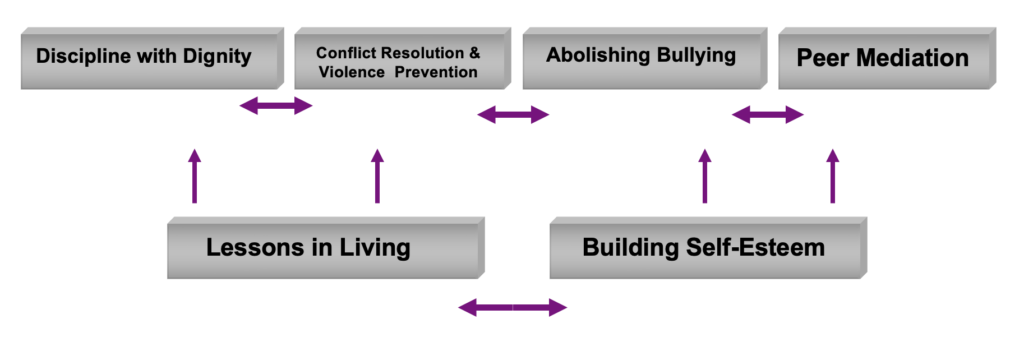Learning P.E.A.C.E.
Delivering practical programs and powerful tools for living well together - proactive. comprehensive. regenerative.
Learning P.E.A.C.E. provides practical and impactful content, actionable tools, detailed lesson plans, and a structured framework that fosters mutual respect, self-awareness, social confidence, and collaborative conflict resolution for individuals in schools, homes, and social settings. The positive culture it promotes extends into all areas of life, both personal and public, on a global scale.
Skill domains: Pro-social skills, emotional intelligence, teamwork, DEI, building self-esteem, communication skills, learning (self)discipline, conflict resolution, violence prevention, abolishing bullying, peer mediation
Who It’s For
Public Schools
Private Schools
Charter Schools
Early Childhood Education Centers
Colleges and Universities
Educators
School Administrators
Educational Consultants
“Teachers, school staff, students, parents, counselors, educators and educational consultants and trainers can regain the necessary foundation and practical means to deflect the onslaught of violence, aggression and sense of isolation by remembering our humanity and practicing tools to appreciate ourselves and one another. Here are tangible tools the counter lacking social skills, the absence of trust in relationships, and low self-esteem. This is how we build strong and kind human interactions.”
Why Choose This Program?
“Tragically, yet logically, our schools are a mirror of the conflictual nature of relationships represented in media, politics and many social situations. Given that all children attend school, it is the optimal venue to teach pro-social skills, communication and relationship tools, and concepts of diversity and inclusion that will then bring up new generations to right our very wayward ship. ”
The following factors outline the contrast between current challenges and the positive, transformed culture that Learning P.E.A.C.E. brings to schools, families, and trainers focused on collective well-being.
Current Challenges in Schools Today:
Disciplinary challenges
Lost classroom and teaching time
Disruptions in the classroom
Inconsistent approaches to problem-solving
Difficulty adhering to behavioral expectations
Expressed frustration or conflict in the classroom and on the playground
Name-calling, exclusionary behaviors
Intolerance of differences
Feelings of exclusion
Lack of connection and empathy
Fear or anxiety related to conflict or aggression
Learning P.E.A.C.E. Program Outcomes:
Consistently practiced problem-solving skills
Cultivated self-regulation
Clear, supportive guidelines and consequences
Acceptance and appreciation of diverse perspectives and ways of being
Cooperative behaviors and mutual support
Empathy and connection with others
Strong sense of belonging and teamwork
A feeling of safety and security in school environments
Engaging and effective lessons
Positive teaching and learning experiences
A supportive and enjoyable school environment
An enhanced school reputation based on a positive culture
How You’ll Use It
The proven content and lesson plans transform the prevalent "me first" and "I don’t care about others" attitudes found in schools, homes, and public life today. The following modules are adaptable for schools, parents, and educational trainers:
Lessons in Living
Children and teenagers are empowered to build positive relationships, take responsibility, and express their natural joy. Diversity, inclusion, teamwork, and nonjudgment are nurtured in this module.
Building Self-Esteem
Self-respect, recognizing and embracing strengths and areas for growth, and enhanced self-worth are fostered through easy-to-apply strategies that work in any group setting.
Discipline with Dignity
Children and teenagers are provided with strategies to develop cooperative behavior and a willingness to follow shared guidelines. These techniques uphold and honor the dignity of each individual, whether child or adult.
Conflict Resolution & Violence Prevention
Children and teenagers are equipped with tools for positive social interaction, which help reduce stress and diffuse most conflicts. Through training in communication, empathy, conflict resolution, and emotional regulation, challenging behavior is transformed.
Abolishing Bullying
This module focuses on developing social competence, raising awareness about aggression, and educating youth on the various forms of bullying. Children and teenagers learn to recognize and redirect their own impulses and effectively respond to the aggression of others. Since bullying is often a precursor to violence, recognizing and addressing it is of critical importance.
Peer Mediation
Teachers and students receive training in mediation techniques, enabling students to resolve conflicts among themselves. These youth mediators become skilled at assisting their peers, reducing the need for adult intervention.
Delivered through the UnitusTI electronic data records cloud
Access from any device, anywhere in the world
The program is delivered to professionals via subscription to the UnitusTI electronic data records (EDR) cloud.
Leading-edge data collection, staff and client management tools and program templates are built right into UnitusTI.
See instant data and quickly graph progress to make informed decisions
Provide reports and share relevant data securely with others
Track staff performance and give them collaboration tools to keep your practice on track
Customizable data collection means you can track as much or as little as you need to keep business humming and your clients happy
UnitusTI features include:
Assessments | Programs | Curricula | Data Acquisition Types | Program Maintenance | Target Maintenance | Pre-defined Reports | Customizable Reports | Service Code Tracking | Session Notes | Graphing | Calendar | Internal Messaging | Document Storage | Session Tracking | Interactive Materials | Role-based Access | Multimedia | Automatic Backups | Billing Prep | Real-time Data Monitoring
What People Are Saying
“The concrete, hands-on tips of Learning P.E.A.C.E. for Schools have helped me to expand upon this subject. After the first day of training I was already looking forward to the next – even thought it was during school holidays!
Although this was professional development training, I was able to take many ideas home to use in my relationships with my own children. Indeed, I’ve successfully applied them. Now I have the same hope for my kids in the classroom at school. ”
“I would absolutely recommend Learning P.E.A.C.E. for Schools, since it deals with relevant subjects of daily school life in a manner that is both practical and easily transferable. ”
“Our professional development program in Learning P.E.A.C.E. for Schools was very impressive for me. Ms Steindorf brought to life for our staff the ideas set forth in the program, many of which we grapple with in our daily work. I feel like I am at the beginning of a new path: to enable the children to establish peaceful relationships and, through consistent small steps, to make this a permanent attitude toward life.”
The content described above is owned and copyrighted by the program author and is provided by Mundo Pato Inc. as an optional, 3rd party add-on to the UnitusTI electronic data records cloud service. Some of the information on this web page has been provided by external sources. Mundo Pato Inc. is not responsible for the accuracy, reliability or currency of the information supplied by external sources. Users wishing to rely upon this information should consult directly with the source of the information.


